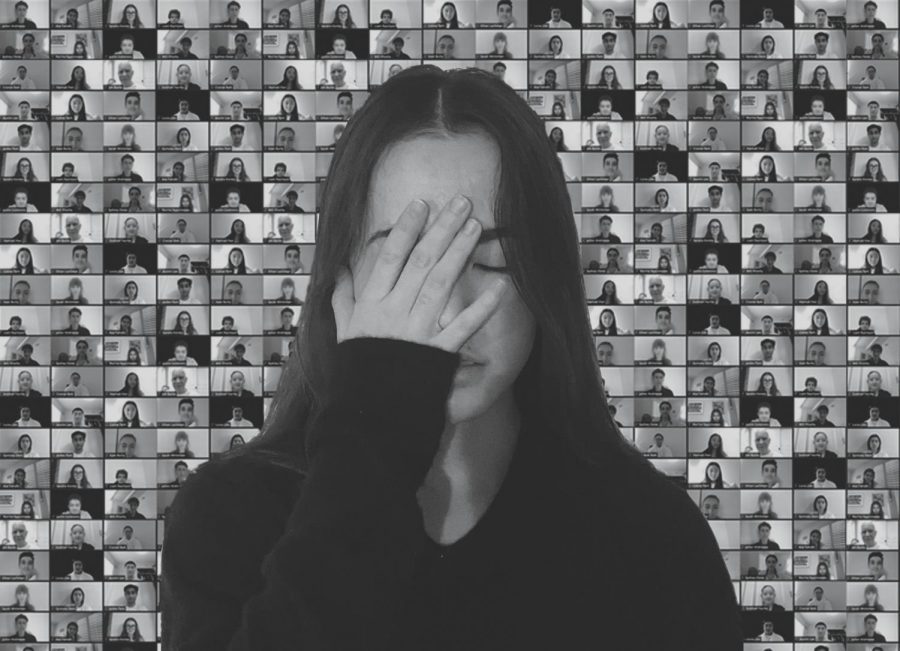Teens in Teletherapy
Siobhan Harms ’21 and Kyle Reims ’21/Chronicle
In light of student isolation as a result of the pandemic, the school has made efforts to host speakers, such as Tony Award-winning actor Ben Platt ’10 and Jackie Greenberg ’19, who talked about their own experiences with mental health.
March 24, 2021
When Upper School Psychologist Sophie Wasson recommended to Lauren Lee ’20 that she meet with a therapist, Lee initially felt resistant to the suggestion. She said she had adopted the common perception that meeting with a licensed mental health professional automatically signifies one’s instability. However, Lee recognized she needed support to combat the grueling academic and social challenges of her junior year and knew her mental health suffered the consequences of struggling in silence.
“At first, I was pretty adverse to [the idea of going to therapy],” Lee said. “I think there is a certain stigma around it that I personally felt and bought into. [Wasson] made [the introduction to therapy] really easy. She laid the groundwork a little bit for me by talking to the therapist, and so I just felt more comfortable going in.”
As a Peer Support Leader, Lee said she had experience in helping her peers with mental health issues through the guidance and personal support of Wasson and Peer Support Advisor Tina McGraw. When the pandemic pushed school to virtual learning, Lee said that online-only interactions took away the safe space that Peer Support offers to students.
“With virtual Peer Support, a lot of the time, unfortunately, problems are about home and people at home,” Lee said. “Family is complicated, and I just think that being in [a certain] place and talking about [a certain situation] is hard.”
In light of student isolation as a result of the pandemic, the school has made efforts to host speakers, such as Tony Award-winning actor Ben Platt ’10 and Jackie Greenberg ’19, who talked about their own experiences with mental health. Maddie Morrison ’22 said that while transitioning to online learning has been challenging, she has become more attuned to her emotions.
“Constantly being by myself during online school has had a huge impact on my mental health,” Morrison said. “I think that online learning has forced me to take a step back and consider how I feel throughout the day, whereas at school, I never had time to think about how I felt. The beginning of quarantine was a really tough adjustment for me, but I think that it has allowed me to find value in being alone sometimes.”
Morrison, who has been in therapy for roughly four years, said virtual sessions pose a new concern that family members can overhear her discussions.
“I definitely do worry that my parents are listening, but that’s not a really big issue for me because my parents don’t really care,” Morrison said. “But I do share a wall with my sister’s room, and I feel like sometimes it’s uncomfortable because you know people are in your house, and you don’t know if anyone can hear you. But it’s okay as long as everything is safe and distanced.”
While she said her video call therapy meetings are less intimate, Morrison feels they are just as effective, if not more effective, than in-person sessions. She said that she enjoys the convenience of meeting from home, as scheduling has become easier. Ultimately, Morrison sincerely values her experience with therapy, she said.
“Especially over Zoom, it’s gotten a lot harder when you’re separated from everyone else, and I think that talking to a therapist is such a profound and deeply personal experience to share intimate details of your life with a stranger that you get to know over time,” Morrison said. “And I think that’s beautiful in a way that you form a relationship with someone that you didn’t even know before, and they become such an integral role in your mental health.”
Dylan Perkins ’236, who has met with his therapist once a week for the past three years, said that despite worrying that a shift to virtual sessions might be difficult, he decided to continue therapy for his mental health. Perkins and his therapist hold sessions using the video call application Simple Practice, and while he said that he now experiences somewhat of a disconnect, his strong relationship with his therapist has made the online transition more comfortable.
“I have had a great experience with therapy,” Perkins said. “It is really important that you find the right person, and if that takes a few tries, that is alright, but once you do, therapy provides a great place for you to talk to someone completely separate from your own life, and I have seen a lot of improvement because of it.”
According to Perkins, what makes therapy such a valuable experience is the opportunity clients have to speak freely in a safe space.
“Everyone should go to therapy in my opinion, though I know that isn’t possible, as it tends to be very expensive,” Perkins said. “It’s good to have a place where you feel safe to talk about anything without having to worry about what someone else might say.”
Similar to Perkins, Upper and Middle School Counselor and licensed therapist Brittany Bronson said she feels passionate about the importance of meeting with a therapist, especially with regard to teenagers.
“I think teens meeting with a therapist is an invaluable experience and one I wish I had when I was a teen,” Bronson said. “What makes therapy valuable is being able to have a safe space to talk with someone who isn’t a family member or friend. [You meet] someone who is supportive and neutral and truly encourages you to be your best self and help you get through whatever challenges you are experiencing in your life.”
Bronson said that therapy can be an incredibly beneficial experience for anyone and encourages people to explore it.
“I am a huge advocate that therapy is for anyone and everyone,” Bronson said. “You don’t have to be in a crisis in order to receive it. Therapy can be a space where you want to work on increasing your self-esteem [and] learning how to cope with stress [and] body image. Therapy is a tool to help you increase your overall well-being which all of us can benefit from at any point in our lives.”
Bronson has continued to hold sessions with clients throughout the pandemic via video and voice call applications.
“I do miss seeing clients in person, but I feel like telehealth is a lot easier for clients to show up to therapy and not worry about traffic, parking [and] commuting,” Bronson said. “I even have some clients who live in Northern California and would not be able to see me for therapy otherwise. But other than not seeing clients in person, I still feel that therapy is just as impactful and helpful as it was before the pandemic.”

































